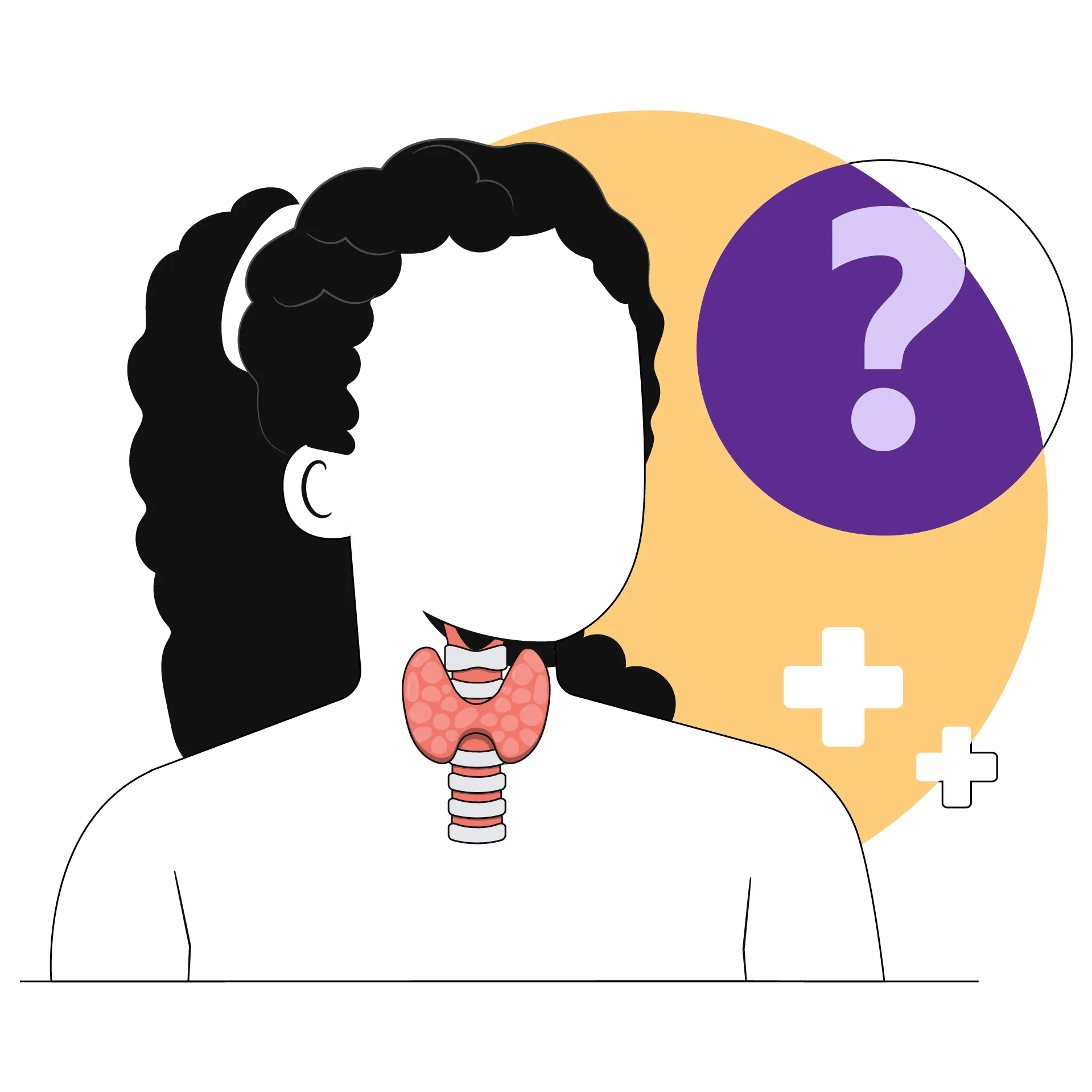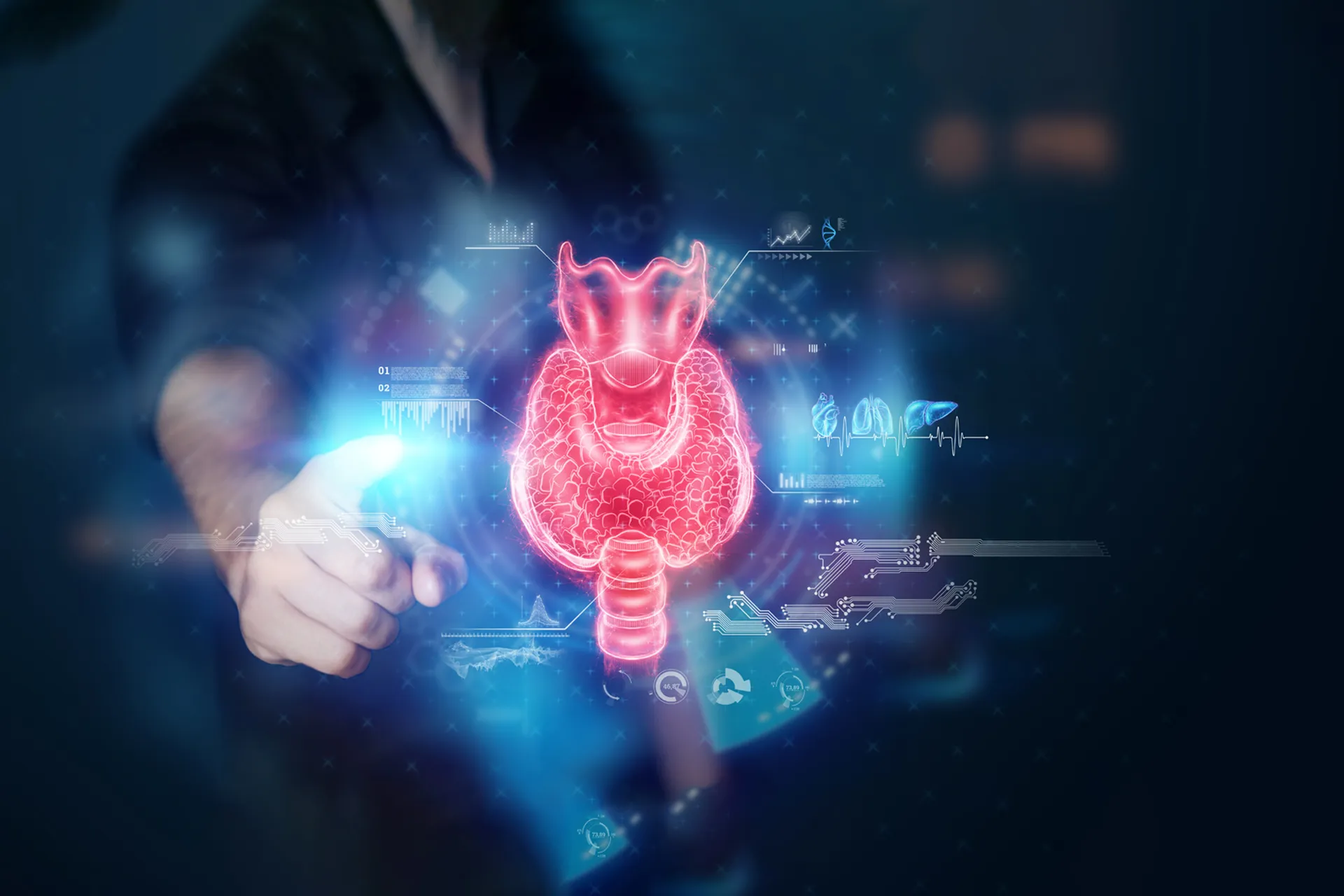Thyroid | 7 min read
Thyroid Nodules: Causes, Symptoms, Types and Diagnosis
Medically reviewed by
Table of Content
Key Takeaways
- Thyroid nodules may be caused due to iodine deficiency or inflammation
- Nodules can be present in other parts of the body like pulmonary nodule
- Thyroid tests can help determine how the nodules affect your thyroid function
Thyroid nodules are unusual growths of thyroid cells. These form in the thyroid gland [1]. The thyroid belongs to your endocrine system, which consists of glands that secrete hormones into your bloodstream. The thyroid gland creates and releases thyroid hormones.
These hormones control functions like digestion, body temperature, and heart functions.
Read on to understand more about thyroid nodules and understand nodules' meaning in depth.
Thyroid Nodules Causes:
Thyroid nodules are a common condition with different causes. Here's a list of a few:-
Thyroiditis
Thyroiditis is a common inflammation affecting the thyroid gland. It can result from an attack by the Epstein-Barr virus (EBV), which is highly contagious and can spread via saliva, which people often share during colds and flu.
Thyroid Cancer
Thyroid cancer is a rare but serious cancer of the thyroid gland. It occurs when cells in the thyroid gland grow out of control and form tumours.Additional read: Lifestyle Change for Managing Thyroid DiseaseIodine Deficiency
Iodine is an essential mineral for proper thyroid function and metabolism. The body needs iodine to make thyroid hormones necessary for regulating metabolism and growth. Iodine deficiency can cause a number of health issues, including goitre and thyroid nodules.

Thyroid Adenoma
Thyroid adenoma is a tumour that originates in the thyroid gland. This type of tumour is the most common cause of thyroid nodules, which are lumps or masses on your neck.
At times the thyroid begins to overgrow, causing nodules to form. The reason behind such overgrowth is still unknown. Cancer is a big concern after these nodules form. Fortunately, it is very rare and only found in 5% of all nodules [2]. Nodules frequently occur in those with a family history of nodules. They may also occur in people with an iodine deficiency, as this is a must for the production of the thyroid hormone. Other causes of thyroid nodules include cysts in the gland, multinodular enlargement of the gland, and inflammation of the gland due to Hashimoto's disease.
Types of Thyroid Nodules
The three types of thyroid nodules are toxic, multinodular goitres, and thyroid cysts.
- Toxic Nodules: Toxic nodules are the most common type of thyroid nodule. They are made up of calcifications that can be caused by several factors, including radiation exposure or repeated infections. Toxic nodules have a sharp edge and feel rough to the touch.
- Multinodular Goitres: Multinodular goitres are more common than toxic nodules. They typically develop from an overgrowth of normal thyroid tissue, which is referred to as a ‘functional’ tumour, or from a non-cancerous tumour called follicular adenoma. Multinodular goitres can cause your body to produce too much thyroid hormone.
- Thyroid Cysts: Thyroid cysts are benign tumours that occur when there's not enough room in your thyroid gland for your cells to grow properly. They can happen at any age if you don't take care of yourself—or if you're exposed to environmental toxins like heavy metals like arsenic or lead.
Here's a little more to know about thyroid nodules:
- Inflammatory nodules are caused by the long-term swelling of the thyroid gland, and they may or may not hurt you.
- Colloid nodules may be a single overgrowth or many overgrowths of the thyroid tissue and are non-cancerous.
- Thyroid cysts are growths that are completely or partially full of fluid.
- Hyperfunctioning thyroid nodules create the thyroid hormone on their own, and since this product is not regulated, they may lead to hyperthyroidism.
- Multinodular goiter refers to an overgrown gland that has a number of nodules.
- Cancerous nodules are those that are malignant, and the chances of these occurring are fewer than 5%
Keep in mind that nodules can be of different kinds, like pulmonary nodules that occur in your lungs or nodule acne of the skin. Nodules do not affect just your thyroid and can be a cause of concern. When they do occur in your gland, they can cause thyroid disorders or an overactive thyroid gland. Talk to your doctor at once when you see any signs and symptoms or get thyroid tests done based on their advice.
Thyroid Nodules Symptoms
Almost all thyroid nodules do not show any particular symptoms. However, if you have large or several nodules, you might be able to feel some symptoms. In rare cases, the nodules can press the structure of your neck and cause symptoms like:
- Voice changes or hoarseness
- Pain in your neck
- The trouble with breathing or swallowing
- Enlargement of the thyroid gland
A hyperfunctioning thyroid nodule can result in the overproduction of thyroid hormones. This condition is known as hyperthyroidism. Symptoms of this are:
- Feelings of touchiness or anxiety
- Tremors or weakness in muscles
- Menstrual problems
- Difficulty in sleeping
- Weight loss
- Vision problems
- Enlarged thyroid gland
- Clammy or itchy skin
- Hair thinning
You can also have low thyroid levels or hypothyroidism, the symptoms of which are:
- Weight gain
- Fatigue
- Heavy menstrual periods
- Hoarse voice
- Weakness or irritability
- Dry, coarse skin and hair
- Hair loss
- Constipation
Thyroid Nodules are a common condition. However, the cause of them is not fully known. Several risk factors may increase your chance of developing a thyroid nodule. Thyroid nodules are found in females, but they can also be found in males. A thyroid nodule is a non-cancerous tumor that appears on the thyroid gland and is about the size of a pencil eraser.
Additionally, several factors may make you more likely to acquire a thyroid nodule. They consist of the following:
- Living in a region of the world where iodine isn't a common food source
- Having thyroid nodules run in your family
- Having matured
- A history of head or neck radiation exposure
Diagnosing Thyroid Nodules
The first step in diagnosing thyroid nodules is finding a doctor specializing in thyroid disorders. You can often find one at your local hospital or community health clinic. Your doctor should be able to tell you whether or not your symptoms might be caused by an enlarged thyroid gland, an enlarged lymph node, or something else altogether.
If you have a large amount of swelling on your neck, your doctor will likely order a blood test and possibly an ultrasound to determine the cause of this swelling. This may require a few visits to the doctor's office before they have all the information they need to make a diagnosis.
If your doctor suspects that you have thyroid nodules, they'll likely ask you about any other symptoms you've been experiencing and what medications or supplements you are taking. Your doctor will want to know if these symptoms started after an increase in exercise levels or if they were present before any changes in diet or lifestyle habits occurred. They may also ask about any family history of thyroid problems or autoimmune diseases.
Tests For Thyroid Nodules:
The tests that will be used to diagnose and evaluate thyroid nodules are a fine needle biopsy, ultrasound, CT scan, and MRI.
A fine needle biopsy is a procedure in which a needle is inserted into the thyroid gland to collect tissue samples. This test can be done at any time during the course of thyroid cancer.
Ultrasound uses high-frequency sound waves to create images of internal organs. It can be used to evaluate thyroid nodules and other structures within the body. The ultrasound images can be used to determine whether there is free fluid around the nodule or if it has ruptured due to disease progression.
CT scan uses X-rays to create cross-sectional images of an object or tissue from multiple angles. CT scans are particularly useful for identifying solid masses within the body and evaluating their size and composition and their relationship with surrounding tissues.
MRI uses radio waves instead of X-rays to produce images of internal organs and tissues; however, MRI does not provide clear pictures like CT scans because it generates data through magnetic fields rather than X-rays.

Thyroid Nodules Treatment
Treatment of nodules depends on the type of thyroid nodules that you have, and the options are:
- Taking no treatment - This process includes letting your nodules be and keeping a check on them to make sure they do not cause any health concerns.
- Performing surgery - This process involves surgically removing your nodules, especially if they are cancerous.
- Use of radioactive iodine -This process involves reducing the nodules in size with radioactive iodine
Now that you know all the important aspects, you can book an online doctor consultation on Bajaj Finserv Health to talk to a doctor such as an endocrinologist. This way, you can discuss the different kinds of thyroid tests that you can take and the thyroid disorders that you should watch out for too. Take expert advice and start focusing on your health today!
References
- https://www.aafp.org/afp/2003/0201/p559.html
- https://www.ncbi.nlm.nih.gov/pmc/articles/PMC5024877/
Disclaimer
Please note that this article is solely meant for informational purposes and Bajaj Finserv Health Limited (“BFHL”) does not shoulder any responsibility of the views/advice/information expressed/given by the writer/reviewer/originator. This article should not be considered as a substitute for any medical advice, diagnosis or treatment. Always consult with your trusted physician/qualified healthcare professional to evaluate your medical condition. The above article has been reviewed by a qualified doctor and BFHL is not responsible for any damages for any information or services provided by any third party.





